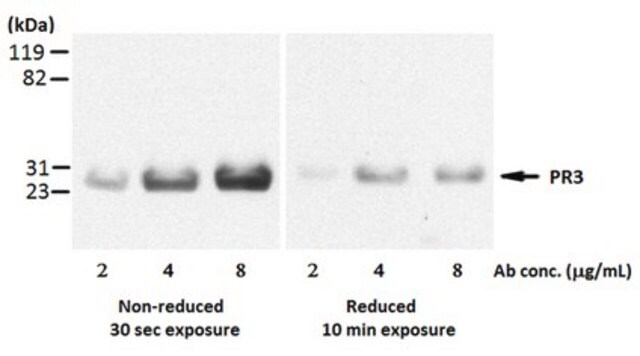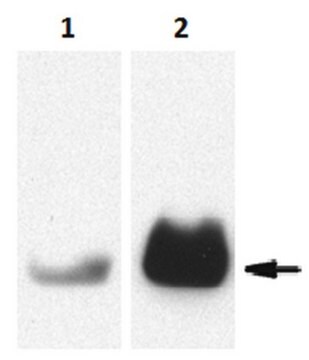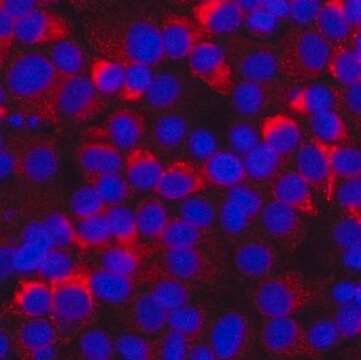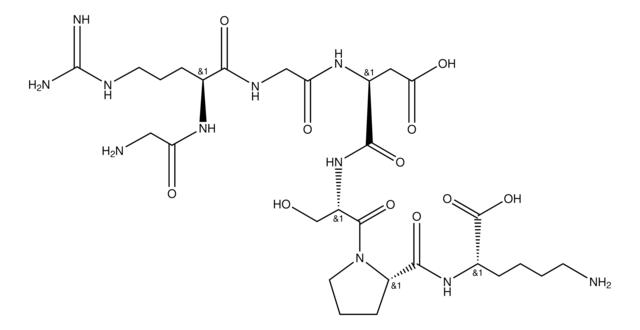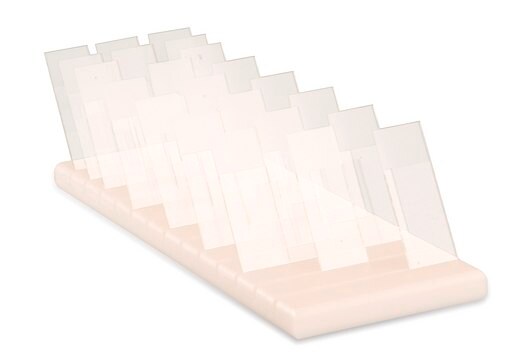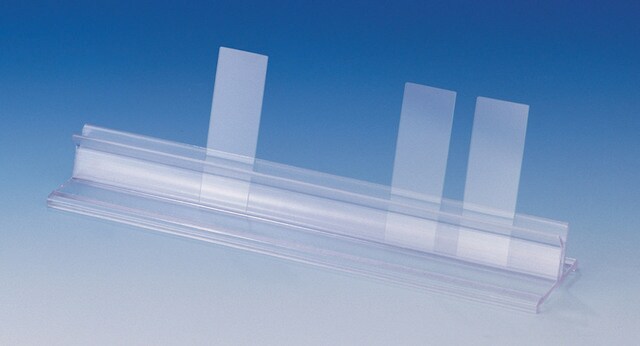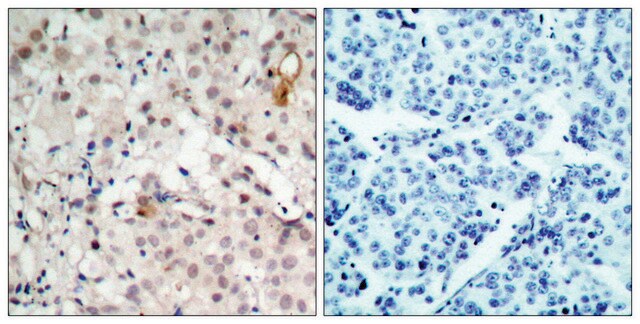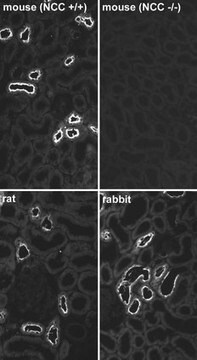推薦產品
生物源
mouse
品質等級
抗體表格
purified immunoglobulin
抗體產品種類
primary antibodies
無性繁殖
MCPR3-7, monoclonal
物種活性
human
應無反應活性
mouse
技術
affinity binding assay: suitable
flow cytometry: suitable
immunoprecipitation (IP): suitable
western blot: suitable
同型
IgG1κ
NCBI登錄號
UniProt登錄號
運輸包裝
dry ice
目標翻譯後修改
unmodified
基因資訊
human ... PRTN3(5657)
一般說明
Myeloblastin (EC 3.4.21.76; UniProt P24158; also known as AGP7, C-ANCA antigen, Leukocyte proteinase 3, Neutrophil proteinase 4, NP-4, P29, PR-3, PR3, Wegener autoantigen) is encoded by the PRTN3 (also known as CANCA, MBN, NP4) gene (Gene ID 5657) in human. Proteinase 3 (PR3) is one of four neutral serine proteases (elastase, cathepsin G, PR3, and neutrophil serine protease 4) stored as fully processed mature enzymes in azurophil granules of human neutrophils. Instead of being targeted to granules after their synthesis, some PR3 molecules end up on the surface of neutrophil plasma membrane in either pro- or mature form. The degree of such surface expression is genetically determined, but the surface exposure and pericellular activity of PR3 around neutrophils can be further upregulated upon neutrophil priming and activation. PR3 autoantibody (anti-neutrophil cytoplasmic antibodies or ANCA) is the main pathogenic feature in patients suffering from granulomatosis with polyangiitis (GPA; formerly called Wegener granulomatosis). ANCAs are shown to activate cytokine-primed neutrophils in vitro by cross-linking surface-exposed PR3 and Fcγ receptors. PR3 activity and/or its inactivation by alpha 1-antitrypsin/alpha-1 proteinase inhibitor (α1PI) varies in the human population and contributes to the risk for GPA manifestations either at onset, during relapses, or during systemic progression. PR3 is initially produced with a signal peptide sequence (a.a. 1-25), an N-terminal and a C-terminal propeptide sequence (a.a. 26-27 and 249-256, respectively), the removal of which yields the mature enzyme (a.a. 28-248).
特異性
Clone MCPR3-7 targets a hydrophobic region of the activation domain involved in the binding of human PR3 to neutrophil membrane receptor NB1/CD177. Clone MCPR3-7 preferentially recognizes PR3 in a pro-form conformation and causes a substrate-dependent inhibition against human PR3 enzymatic activity by altering PR3 S1′ pocket conformation, but not PR3 S1 pocket conformation (Hinkofer, L.C., et al. (2013). J. Biol. Chem. 288(37):26635-26648).
免疫原
Epitope: A hydrophobic region of the activation domain (Hinkofer, L.C., et al. (2013). J. Biol. Chem. 288(37):26635-26648; Silva, F., et al. (2010). J. Autoimmun. 35(4) 299-308).
Recombinant proP-PR3ctp (Hinkofer, L.C., et al. (2013). J. Biol. Chem. 288(37):26635-26648).
應用
Anti-Proteinase 3/PR3 Antibody, clone MCPR3-7 is an antibody against PR3 for use in Affinity Binding Assay, Flow Cytometry, Immunoprecipitation, Inhibition Assay, and Western Blotting.
Research Category
Cell Structure
Cell Structure
Research Sub Category
Inflammation & Autoimmune Mechanisms
Inflammation & Autoimmune Mechanisms
Western Blotting Analysis: 1-2 µg/mL from a representative lot detected 1 µg of recombinant human pro-PR3 under non-reducing condition, but not under reducing condition (Courtesy of Amber Hummel, Mayo Clinic, Rochester, MN).
Flow Cytometry Analysis: A representative lot immunostained the surface of only a small subpopulation of human peripheral blood neutrophils that are stained positive with clone MCPR3-2 (Cat. No. MABT340), consistent with the surface PR3 being in an active conformation complexed with CD177 and/or lipid bilayers. (Hinkofer, L.C., et al. (2013). J. Biol. Chem. 288(37):26635-26648).
Flow Cytometry Analysis: A representative lot bound recombinant human PR3-, but not murine PR3-, coated Talon-beads as determined by FACS analysis. (Silva, F., et al. (2010). J. Autoimmun. 35(4) 299-308).
Flow Cytometry Analysis: A representative lot bound immobilized recombinant human PR3 via a distinct epitope than those recognized by clone MCPR3-2 and MCPR3-3 (Cat. No. MABT340 and MABF973, respectively) as determined by FACS analysis of bead-based competition binding assay (Silva, F., et al. (2010). J. Autoimmun. 35(4) 299-308).
Immunoprecipitation Analysis: A representative lot immunoprecipitated a recombinant human PR3 construct proP-PR3ctp that adopts a pro-PR3 conformation, while exhibiting greater than 75% reduced affinity toward a recombinant construct ΔPR3ctp-S195A that adopts a mature PR3 conformation (Hinkofer, L.C., et al. (2013). J. Biol. Chem. 288(37):26635-26648).
Inhibition Analysis: A representative lot caused a substrate-dependent inhibition against human PR3 enzymatic activity by altering PR3 S1′ pocket conformation, but not PR3 S1 pocket conformation (Hinkofer, L.C., et al. (2013). J. Biol. Chem. 288(37):26635-26648).
Affinity Binding Assay: A representative lot captured a recombinant human PR3 construct proP-PR3ctp that adopts a pro-PR3 conformation, while exhibiting greater than 75% reduced affinity toward a recombinant construct ΔPR3ctp-S195A that adopts a mature PR3 conformation (Hinkofer, L.C., et al. (2013). J. Biol. Chem. 288(37):26635-26648).
Flow Cytometry Analysis: A representative lot immunostained the surface of only a small subpopulation of human peripheral blood neutrophils that are stained positive with clone MCPR3-2 (Cat. No. MABT340), consistent with the surface PR3 being in an active conformation complexed with CD177 and/or lipid bilayers. (Hinkofer, L.C., et al. (2013). J. Biol. Chem. 288(37):26635-26648).
Flow Cytometry Analysis: A representative lot bound recombinant human PR3-, but not murine PR3-, coated Talon-beads as determined by FACS analysis. (Silva, F., et al. (2010). J. Autoimmun. 35(4) 299-308).
Flow Cytometry Analysis: A representative lot bound immobilized recombinant human PR3 via a distinct epitope than those recognized by clone MCPR3-2 and MCPR3-3 (Cat. No. MABT340 and MABF973, respectively) as determined by FACS analysis of bead-based competition binding assay (Silva, F., et al. (2010). J. Autoimmun. 35(4) 299-308).
Immunoprecipitation Analysis: A representative lot immunoprecipitated a recombinant human PR3 construct proP-PR3ctp that adopts a pro-PR3 conformation, while exhibiting greater than 75% reduced affinity toward a recombinant construct ΔPR3ctp-S195A that adopts a mature PR3 conformation (Hinkofer, L.C., et al. (2013). J. Biol. Chem. 288(37):26635-26648).
Inhibition Analysis: A representative lot caused a substrate-dependent inhibition against human PR3 enzymatic activity by altering PR3 S1′ pocket conformation, but not PR3 S1 pocket conformation (Hinkofer, L.C., et al. (2013). J. Biol. Chem. 288(37):26635-26648).
Affinity Binding Assay: A representative lot captured a recombinant human PR3 construct proP-PR3ctp that adopts a pro-PR3 conformation, while exhibiting greater than 75% reduced affinity toward a recombinant construct ΔPR3ctp-S195A that adopts a mature PR3 conformation (Hinkofer, L.C., et al. (2013). J. Biol. Chem. 288(37):26635-26648).
品質
Identity Confirmation by Isotyping Test.
Isotyping Analysis: The identity of this monoclonal antibody is confirmed by isotyping test to be IgG1κ.
Isotyping Analysis: The identity of this monoclonal antibody is confirmed by isotyping test to be IgG1κ.
標靶描述
~32 kDa observed. 27.81 kDa (Pro-PR3; a.a. 1-256), 25.14 kDa (N-terminal signal and propeptide removed; a.a. 28-256), 24.25 kDa (Mature; a.a. 28-248) calculated.
外觀
Protein G Purified
Format: Purified
Purified mouse monoclonal IgG1κ antibody in PBS without preservatives.
儲存和穩定性
Stable for 1 year at -20°C from date of receipt.
Handling Recommendations: Upon receipt and prior to removing the cap, centrifuge the vial and gently mix the solution. Aliquot into microcentrifuge tubes and store at -20°C. Avoid repeated freeze/thaw cycles, which may damage IgG and affect product performance.
Handling Recommendations: Upon receipt and prior to removing the cap, centrifuge the vial and gently mix the solution. Aliquot into microcentrifuge tubes and store at -20°C. Avoid repeated freeze/thaw cycles, which may damage IgG and affect product performance.
其他說明
Concentration: Please refer to lot specific datasheet.
免責聲明
Unless otherwise stated in our catalog or other company documentation accompanying the product(s), our products are intended for research use only and are not to be used for any other purpose, which includes but is not limited to, unauthorized commercial uses, in vitro diagnostic uses, ex vivo or in vivo therapeutic uses or any type of consumption or application to humans or animals.
未找到適合的產品?
試用我們的產品選擇工具.
儲存類別代碼
12 - Non Combustible Liquids
水污染物質分類(WGK)
WGK 2
閃點(°F)
Not applicable
閃點(°C)
Not applicable
分析證明 (COA)
輸入產品批次/批號來搜索 分析證明 (COA)。在產品’s標籤上找到批次和批號,寫有 ‘Lot’或‘Batch’.。
我們的科學家團隊在所有研究領域都有豐富的經驗,包括生命科學、材料科學、化學合成、色譜、分析等.
聯絡技術服務